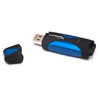- Qualcomm Launches Snapdragon 4 Gen 2 Mobile Platform
- AMD Launches Ryzen PRO 7000 Series Mobile & Desktop Platform
- Intel Launches Sleek Single-Slot Arc Pro A60 Workstation Graphics Card
- NVIDIA Announces Latest Ada Lovelace Additions: GeForce RTX 4060 Ti & RTX 4060
- Maxon Redshift With AMD Radeon GPU Rendering Support Now Available
Kingston DataTraveler HyperX 3.0 64GB Flash Drive Review

On the lookout for a flash drive that not only offers ample storage but also great performance? If so, Kingston’s DT HyperX 3.0 is well worth a look. It’s available in 64GB – 256GB flavors and offers performance of 225MB/s read and 135MB/s write. So let’s take it for a spin and see how it fares to the previously-reviewed DT Ultimate 3.0.
Page 2 – Test System & Methodology; Iometer, HD Tune Pro & PCMark Vantage
For most of our performance-type content, we hold nothing back when explaining our methodologies and beliefs. But as this is simply an external storage review, we don’t feel there’s quite as important a need to do that. If you’ve read our other performance content, you already know how seriously we take our testing practices, as it’s obvious that coming up with an accurate end score for any benchmark is very important. In the case of flash drives, we repeat all tests at least twice to verify that our results are accurate.
|
Component
|
Model
|
| Processor |
Intel Core i7-980X – Six-Core, 3.33GHz, 1.30v
|
| Motherboard |
Gigabyte GA-X58A-UD5 (Rev 1.0) – X58-based, F5 BIOS
|
| Memory |
Kingston HyperX – 12GB DDR3-1333 7-7-7-24-1T, 1.60v
|
| Graphics | NVIDIA GeForce GTX 580 1.5GB – GeForce 275 |
| Audio |
On-Board Audio
|
| Storage |
Corsair Force F160 160GB – (Data Transfer > USB Device & OS) |
| Power Supply | |
| Chassis |
Corsair Obsidian 800D
|
| Display |
Dell 24" 2408WFP
|
| Cooling |
Corsair H60
|
| Et cetera |
For our real-world transfer tests, the source files are stored on Corsair’s Force F160 160GB solid-state disk, which avails us a top-end read speed of around 285MB/s. Unless the USB device we’re testing with is able to write in excess of that, there should be no bottleneck.
Iometer 2006.07.27
To start things off, we’re using Iometer, a popular storage benchmarking application that’s as effective as it is customizable. It’s for both of those reasons that we choose to use it, and also thanks to the fact that it’s capable of outputting the results to both MB/s and IOPS (in/out operations per second). The latter is the value we focus on, as it’s become a standard for measuring performance in enterprise/IT environments.
Admittedly, running this test on most USB flash drives, especially 2.0 models, is not entirely important given the typical manner they’re used, but it’s our goal to see where one excels over another when dealing with such an intensive test. IOPS performance would be very important if you were to install an OS on a flash drive, as long as the bandwidth throughput is also good.



High IOPS is rarely a priority on Kingston’s list when developing a product like this, as the company feels the overall throughput is more important than the number of simulataneous transfers that are possible. On a product with IOPS performance comparable to a hard drive, I’d agree, but here, we see IOPS performance much, much lower than even the Ultimate 3.0 – almost 1/4th.
What does this mean to you? Not much if all you are doing is copying over a handful of files at a time. If you are copying over folders with hundreds or thousands of files, the transfer rate will slow down considerably due to the lacking endurance.
HD Tune Pro 3.5
One of the simplest methods for testing storage is with HD Tune, and as it’s able to give reliable and repeatable results, we like using it in our testing. Although the program offers a good range of testing methods, we use the basic test that gives us read speeds and also access latencies.


For some reason, HD Tune seems to work better on thumb drives and hard drives than it does on SSDs (SATA 6Gbit/s SSDs rarely show their true colors here, for example), and these results show that to be the case. OCZ’s Enyo external SSD has IOPS performance quite literally 500x the HyperX 3.0, but its throughput performance lacked a bit here. The HyperX 3.0 walks away a clear winner – where access times are not concerned, at least.
PCMark Vantage
One of the more popular storage benchmarks currently is Futuremark’s PCMark Vantage. Even though this is a suite designed to benchmark your entire machine, it’s HDD suite test is quite robust and is good at delivering scores that scale well with the storage device you are benchmarking. Almost all of the storage companies we deal with regularly recommend using it, so we do.

Compared to the Ultimate 3.0, the improved speeds on the HyperX 3.0 pushed it well into the lead. No thumb drive seems to compare to OCZ’s Enyo and Kingston’s own HyperX Max external SSDs, however.
Support our efforts! With ad revenue at an all-time low for written websites, we're relying more than ever on reader support to help us continue putting so much effort into this type of content. You can support us by becoming a Patron, or by using our Amazon shopping affiliate links listed through our articles. Thanks for your support!





